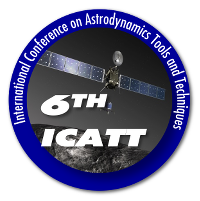Speaker
Dr
Hancheol Cho
(Université de Liège)
Description
Owing to the well-established correlation between spacecraft mass and mission’s cost, there is great interest in fuel-optimal relative maneuvers between two or more satellites in the literature. In this context, the exploitation of natural perturbations is an attractive means to reduce or even remove fuel consumption, and, hence, propellantless maneuvers using solar radiation pressure, geomagnetic field, Coulomb forces, and atmospheric drag were proposed. Amongst them, the idea to use differential drag as control force for relative motion is particularly attractive to enhance the maneuverability of small satellites in low-Earth orbit, so that ongoing and forthcoming missions envisage this technique to achieve propellantless rendez-vous, cluster keeping, or constellation deployment, e.g., QARMAN, SAMSON, and Flock, respectively.
Because of several assumptions and modeling limitations, however, severe uncertainties affect satellite drag estimation. In order to effectively compensate for these uncertainties, successful attempts that include linear quadratic regulators, nonlinear adaptive control, model predictive control, and sliding mode control (SMC) were applied. SMC is widely adopted to cope with uncertainties due to its high robustness, however, it has two major drawbacks when applied to real-life problems:
- It usually causes **chattering**, i.e., high-frequency oscillations in the control force. When attitude control is used to tune differential drag, chattering can degrade the control performance and even jeopardize the maneuver if attitude actuators are saturated, e.g., reaction wheels.
- Prior knowledge of the **uncertainty bounds** is required. This is in general difficult to accurately estimate especially for time-varying drag forces.
In this paper a new chattering-free sliding mode controller is developed to perform an optimal rendez-vous of two satellites in low-Earth orbit, exploiting differential drag as control force. The proposed controller is designed to successfully compensate for uncertainty effects and/or unmodeled dynamics associated with air drag and to account for practical limitations such as input saturation. **Continuity of the control functions embedded in the new controller guarantees no chattering.** It is also shown that **an accurate estimation of the uncertainty bounds is not necessary.** Specifically, selecting conservative bounds leads to smaller errors, while the required control effort is not very sensitive to these bounds. Numerical examples are used to validate the robustness and accuracy of the new chattering-free sliding mode controller.
| Applicant type | First author |
|---|
Primary author
Dr
Hancheol Cho
(Université de Liège)
Co-authors
Prof.
Gaetan Kerschen
(Université de Liège)
Dr
Lamberto Dell'Elce
(Université de Liège)

